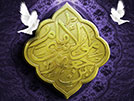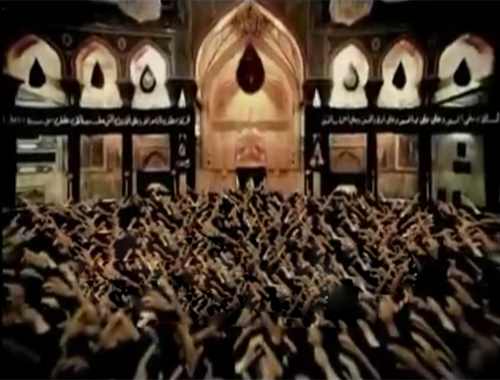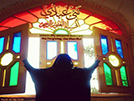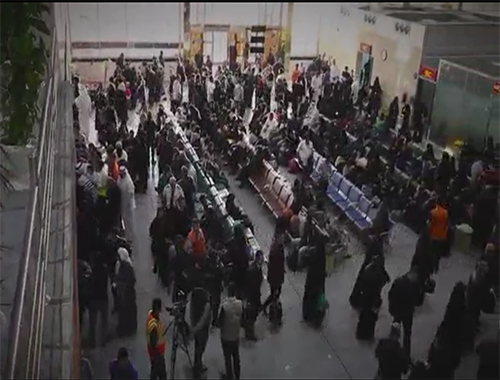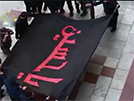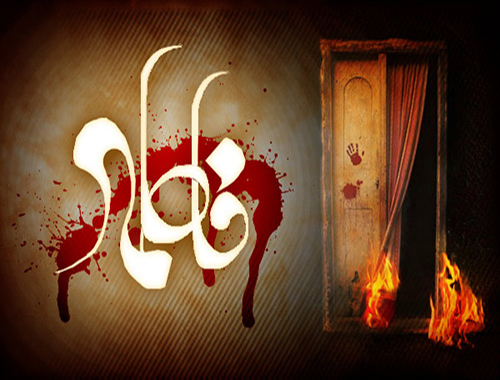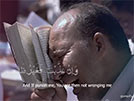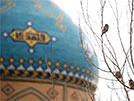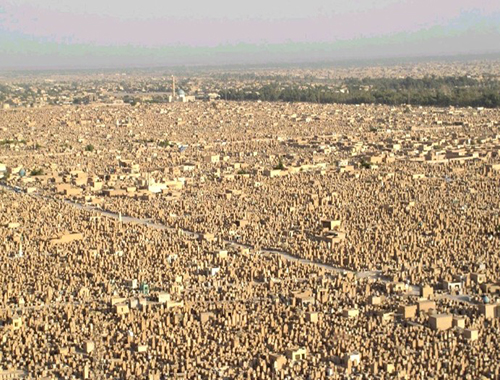From The Signs Of His Imamate
- Details
- Hits: 6102
From The Signs Of His Imamate
Allah had provided the prophets and their guardians with miracles that ordinary people were unable to do in order to be as true proofs on the missions of these prophets and guardians, otherwise they would fail in achieving their missions, and none of people would believe them.
Allah had made them know what there was inside the inners of people and what events would take place. Allah had granted that to the infallible imams of the Ahlul Bayt (AS) and one of them was Imam al-Hasan al-Askari (AS).
Here we mention some narrations concerning this matter:
1. Al-Hasan an-Naseebi said, ‘It came to my mind that whether the sweat of a junub[1] was pure or not. I went to the house of Abu Muhammad al-Hasan to ask him about that.
It was night and so I slept. At dawn, he came out and found me sleeping. He waked me and said, ‘If it is lawful, it is pure, and if it is from unlawful thing, it is not.’[2]
2. Isma’il bin Muhammad al-Abbasi said, ‘One day, I complained to Abu Muhammad about my neediness and I swore to him that I did not have even one dirham.’ He said to me, ‘Do you swear by Allah falsely while you have buried two hundred dinars? My saying to you does not mean that I do not gift you.
O servant, give him what there is with you!’ The servant gave me one hundred dinars. Then he (the imam) said to me, ‘You make the dinars that you have buried unlawful while you are in utmost need to them.’
I searched for the money but I could not find it. I found that one of my children knew about this money, and so he stole them and ran away.’
________________________________________
[1] A ritually impure person: janaba is the major (or minor) ritual impurity caused by sexual intercourse, wet dreams…
[2] Mir’at az-Zaman, vol.6 p.192.
3. Muhammad bin Hujr complained to the imam at the oppression he received from Abdul Aziz and from Yazid bin Eesa.
The imam (AS) said to him, ‘As for Abdul Aziz, I have relieved you from him, but as for Yazid, you and he shall have a situation before Allah the Almighty.’
After a few days, Abdul Aziz died, but Yazid killed Muhammad bin Hujr and he shall have a situation (be punished) before Allah (on the Day of Resurrection).’[1]
4. Abu Hashim said, ‘Once, I complained to Abu Muhammad of the distress of imprisonment and the pains of ties. He wrote to me, ‘You shall offer the Dhuhr (noon) Prayer in your house today.’ I was set free (from prison) at noon and I offered the prayer in my house as the imam had said.’[2]
5. Abu Hashim said, ‘I was in need and I wanted to ask Imam Abu Muhammad (AS) but I felt shy to do that. When I arrived in my house, he sent one hundred dinars to me and a letter saying, ‘If you need something, do not feel shy or refrain from asking. Ask and you shall get what you like inshallah.’[3]
6. Abu Hashim said, “I heard Abu Muhammad (AS) saying, ‘In the paradise there is a gate called al-Ma’ruf (good deed). No one will come through it except the people of good deeds.’ I thanked Allah with myself and felt delighted for I often satisfied the needs of people.
Abu Muhammad looked at me and said, ‘Yes, I knew what you were thinking of. The people of good deeds in this life will be the people of good deeds in the afterlife. May Allah make you from them, O Abu Hashim, and have mercy on you.’”[4]
________________________________________
[1] Manaqib Aal Abi Talib, vol.4 p.433.
[2] A’lam al-Wara, p.372.
[3] Ath-Thaqib fil-Manaqib by Muhammad bin Ali al-Jirjani, p.241.
[4] Noor al-Absar, p.152.
7. Muhammad bin Hamza ad-Duri said, ‘I wrote to Imam Abu Muhammad (AS) asking him to pray Allah for me to make me rich after I had become poor and I feared to be exposed.
His reply came to me saying: “Be delighted! Wealth has come to you from Allah the Almighty. Your cousin Yahya bin Hamza died and left for you one hundred thousand dirhams. He had no inheritor except you.
The money shall come to you soon. Thank Allah, be economical, and beware of wasting!” The money and the news of the death of my cousin came to me a few days later. My poverty disappeared. I paid the rights of Allah, helped my brothers, and became economical after I had been wasteful.’[1]
8. Muhammad bin al-Hasan bin Maymun said, ‘I wrote to my master al-Hasan al-Askari (AS) complaining of poverty, and then I said to myself: has Abu Abdullah (Imam as-Sadiq) (AS) not said, ‘Poverty with us (the Ahlul Bayt) is better than wealth with our enemy, and being killed with us is better than living with our enemy.’?
The reply to my letter came saying, ‘Allah the Almighty tries our followers, when their sins increase, by poverty, and He may forgive many (of sins). It is as your self said to you: poverty with us is better than wealth with our enemy.
We are a shelter for whoever resorts to us a light for whoever seeks light, and preservation for whoever turns to us. Whoever loves us will be with us in the highest position, and whoever deviates from us will be in Fire.’[2]
9. Abu Ja’far al-Hashimi said, ‘I was with some men in prison when Abu Muhammad and his brother Ja’far were brought to prison. We hurried to him. I kissed him on the face, and seated him on a mat that was under me.
Ja’far sat near to him. The guard of the prison was Salih bin Waseef. There was a man with us in the prison claiming that he was Alawid.
________________________________________
[1] Noor al-Absar, p.152, ad-Durr an-Nadheem.
[2] Manaqib Aal Abi Talib, vol.4 p.435.
Abu Muhammad turned to us and said, ‘If some one, who is not from you, was not with you, I would tell you when Allah will deliver you…’ Imam Abu Muhammad (AS) beckoned to that man and said, ‘This man is not from you.
Beware of him! There is a book in his clothes in which he writes to the ruler all what you say.’ One of the prisoners searched him and found with him a book in which he accused us of great accusations and claimed that we wanted to pierce the prison and escape from it.’[1]
10. Ahmad bin Muhammad said, “I wrote a letter to Abu Muhammad (AS) when al-Muhtadi, the Abbasid caliph, began killing the Shia and said to him, ‘O my master, praise be to Allah Who has made him (the caliph) busy away from you for I have heard that he threatened you and said: ‘by Allah, I will dispel them again.’
Abu Muhammad wrote with his handwriting: ‘This makes his life shorter. You count from this day five days and he shall be killed in the sixth day after meeting meanness and disgrace.’ And it was as the imam said.’[2]
11. Abu Hashim narrated, ‘Once, al-Fahfaki asked Imam Abu Muhammad (AS) about the reason that makes man take two shares while woman takes one share in the inheritance. The imam (AS) answered: ‘For neither jihad, nor expenditure, nor guarding (in castles) are required from woman.’
It came to my mind that this question was the same question that ibn Abul Awja’ had asked Imam as-Sadiq (AS) and Imam as-Sadiq (AS) answered with the same answer. Imam Abu Muhammad turned towards me and said, ‘Yes, this is the question of ibn Abul Aw’aj and the answer is the same from us. If the meaning of the question is the same, the answer of the last one of us will be like the answer of the first one of us.
________________________________________
[1] Ad-Durr an-Nadheem fee Manaqib al-A’immah, 2897.
[2] A’lam al-Wara, p.375.
The first and the last of us are the same in knowledge and imamate, and the messenger of Allah and Ameerul Mo’mineen (the blessings of Allah be on them) have the preference to them.’[1]
12. Abu Hashim narrated, ‘One of the Shia wrote to Abu Muhammad (AS) asking him for some supplication.
The Imam replied, ‘Pray Allah with this du’a: “O You the most Hearing of hearers, the most Perceptive of seers, the best of lookers, the promptest of accounters, the Most Merciful of the merciful, the Wisest of judges, have blessing on Muhammad and on the progeny of Muhammad, and increase my livelihood, prolong my old, favor me with Your mercy, make me from those who defend Your religion, and do not replace me by other than me…!”
I (Abu Hashim) said with myself: ‘O Allah, make me from Your party and Your group!’ Abu Muhammad turned to me and said, ‘you are in His party and in His group if you have faith in Allah and believe His messenger.’[2]
13. Shahwayh bin Abd Rabbih said, ‘My brother Salih was in prison. I wrote to my master Abu Muhammad (AS) asking him about some things and he answered by writing to me: ‘Your brother Salih shall be set free from prison on the day when my this book shall come to you.
You wanted to ask me about him but you had forgotten.’ While I was reading his book, some one came and told me that my brother was set free. I received him and read this book to him.’[3]
14. Abu Hashim narrated, ‘It came to my mind whether the Qur'an was created or not.
________________________________________
[1] Al-Manaqib, vol.4 p.437, A’lam al-Wara, p.374.
[2] A’lam al-Wara, p.374.
[3] Al-Manaqib, vol4 p.438.
Imam Abu Muhammad (AS) looked at me and said, ‘O Abu Hashim, Allah is the Creator of everything, and everything other than Him is created.’[1]
15. Abu Hashim said, ‘Once, I went to Abu Muhammad (AS) and wanted to ask him for a stone that I wanted to make a ring from to bless myself with it. When I sat with him, I forgot what I had come for.
When I said farewell and wanted to leave, he gave me a ring, smiled, and said, ‘You wanted a stone and we gave you a ring, and so you won the stone.
May Allah delight you by it!’ I was astonished at that and said, ‘O my master, you are the guardian of Allah and my imam by whose favor and obedience I serve Allah.’ He said to me, ‘May Allah pardon you, Abu Hashim!’[2]
16. Abu Hashim said, “Once, I heard Abu Muhammad saying, ‘On the Day of Resurrection, Allah will forgive with forgiveness that cannot be even imagined by people, until polytheists shall say: by Allah, we were not polytheists.’
I remembered with myself a tradition narrated to me by a man from our companions from the people of Mecca that the messenger of Allah (AS) recited: (Despair not of the Mercy of Allah, for Allah forgives all sins),[3] and some man said, ‘even polytheists.’ I denied that and hid it into my heart.
While I was thinking of that with myself, Abu Muhammad turned to me and recited, (Surely Allah does not forgive that anything is associated with Him, and He forgives all save that to whom He pleases).[4] How bad what that man said was and how bad what he narrated was!’[5]
________________________________________
[1] Al-Manaqib, vol4, p.436.
[2] A’lam al-Wara, vol375, al-Manaqib, vol.4 p.437.
[3] Qur'an, 39:53.
[4] Qur'an, 4:116.
[5] Ad-Durr an-Nadheem.
Historians mentioned many examples on the imam’s knowledge of what people concealed inside themselves, and on his predicting of different events and occurrences.
All those were signs on his imamate, for other than the imams had no knowledge about that. Abu Hashim, who was one of the best, reliable scholars, and who was a close companion to Imam Abul Hasan al-Hadi (AS) and Imam Abu Muhammad al-Askari (AS), narrated most of the traditions that talked about the signs of these two imams (AS).
He said, ‘Whenever I went to Abul Hasan and Abu Muhammad (peace be upon them), I saw a proof and evidence (on their imamate).’[1]
________________________________________
[1] A’lam al-Wara, p.375.
Taken from : The Life Of Imam Al-Hasan Al-Askari Study And Analysis By: Baqir Shareef al-Qurashi Translation by: Abdullah al-Shahin
Here we mention some narrations concerning this matter:
1. Al-Hasan an-Naseebi said, ‘It came to my mind that whether the sweat of a junub[1] was pure or not. I went to the house of Abu Muhammad al-Hasan to ask him about that.
It was night and so I slept. At dawn, he came out and found me sleeping. He waked me and said, ‘If it is lawful, it is pure, and if it is from unlawful thing, it is not.’[2]
2. Isma’il bin Muhammad al-Abbasi said, ‘One day, I complained to Abu Muhammad about my neediness and I swore to him that I did not have even one dirham.’ He said to me, ‘Do you swear by Allah falsely while you have buried two hundred dinars? My saying to you does not mean that I do not gift you.
O servant, give him what there is with you!’ The servant gave me one hundred dinars. Then he (the imam) said to me, ‘You make the dinars that you have buried unlawful while you are in utmost need to them.’
I searched for the money but I could not find it. I found that one of my children knew about this money, and so he stole them and ran away.’
________________________________________
[1] A ritually impure person: janaba is the major (or minor) ritual impurity caused by sexual intercourse, wet dreams…
[2] Mir’at az-Zaman, vol.6 p.192.
3. Muhammad bin Hujr complained to the imam at the oppression he received from Abdul Aziz and from Yazid bin Eesa.
The imam (AS) said to him, ‘As for Abdul Aziz, I have relieved you from him, but as for Yazid, you and he shall have a situation before Allah the Almighty.’
After a few days, Abdul Aziz died, but Yazid killed Muhammad bin Hujr and he shall have a situation (be punished) before Allah (on the Day of Resurrection).’[1]
4. Abu Hashim said, ‘Once, I complained to Abu Muhammad of the distress of imprisonment and the pains of ties. He wrote to me, ‘You shall offer the Dhuhr (noon) Prayer in your house today.’ I was set free (from prison) at noon and I offered the prayer in my house as the imam had said.’[2]
5. Abu Hashim said, ‘I was in need and I wanted to ask Imam Abu Muhammad (AS) but I felt shy to do that. When I arrived in my house, he sent one hundred dinars to me and a letter saying, ‘If you need something, do not feel shy or refrain from asking. Ask and you shall get what you like inshallah.’[3]
6. Abu Hashim said, “I heard Abu Muhammad (AS) saying, ‘In the paradise there is a gate called al-Ma’ruf (good deed). No one will come through it except the people of good deeds.’ I thanked Allah with myself and felt delighted for I often satisfied the needs of people.
Abu Muhammad looked at me and said, ‘Yes, I knew what you were thinking of. The people of good deeds in this life will be the people of good deeds in the afterlife. May Allah make you from them, O Abu Hashim, and have mercy on you.’”[4]
________________________________________
[1] Manaqib Aal Abi Talib, vol.4 p.433.
[2] A’lam al-Wara, p.372.
[3] Ath-Thaqib fil-Manaqib by Muhammad bin Ali al-Jirjani, p.241.
[4] Noor al-Absar, p.152.
7. Muhammad bin Hamza ad-Duri said, ‘I wrote to Imam Abu Muhammad (AS) asking him to pray Allah for me to make me rich after I had become poor and I feared to be exposed.
His reply came to me saying: “Be delighted! Wealth has come to you from Allah the Almighty. Your cousin Yahya bin Hamza died and left for you one hundred thousand dirhams. He had no inheritor except you.
The money shall come to you soon. Thank Allah, be economical, and beware of wasting!” The money and the news of the death of my cousin came to me a few days later. My poverty disappeared. I paid the rights of Allah, helped my brothers, and became economical after I had been wasteful.’[1]
8. Muhammad bin al-Hasan bin Maymun said, ‘I wrote to my master al-Hasan al-Askari (AS) complaining of poverty, and then I said to myself: has Abu Abdullah (Imam as-Sadiq) (AS) not said, ‘Poverty with us (the Ahlul Bayt) is better than wealth with our enemy, and being killed with us is better than living with our enemy.’?
The reply to my letter came saying, ‘Allah the Almighty tries our followers, when their sins increase, by poverty, and He may forgive many (of sins). It is as your self said to you: poverty with us is better than wealth with our enemy.
We are a shelter for whoever resorts to us a light for whoever seeks light, and preservation for whoever turns to us. Whoever loves us will be with us in the highest position, and whoever deviates from us will be in Fire.’[2]
9. Abu Ja’far al-Hashimi said, ‘I was with some men in prison when Abu Muhammad and his brother Ja’far were brought to prison. We hurried to him. I kissed him on the face, and seated him on a mat that was under me.
Ja’far sat near to him. The guard of the prison was Salih bin Waseef. There was a man with us in the prison claiming that he was Alawid.
________________________________________
[1] Noor al-Absar, p.152, ad-Durr an-Nadheem.
[2] Manaqib Aal Abi Talib, vol.4 p.435.
Abu Muhammad turned to us and said, ‘If some one, who is not from you, was not with you, I would tell you when Allah will deliver you…’ Imam Abu Muhammad (AS) beckoned to that man and said, ‘This man is not from you.
Beware of him! There is a book in his clothes in which he writes to the ruler all what you say.’ One of the prisoners searched him and found with him a book in which he accused us of great accusations and claimed that we wanted to pierce the prison and escape from it.’[1]
10. Ahmad bin Muhammad said, “I wrote a letter to Abu Muhammad (AS) when al-Muhtadi, the Abbasid caliph, began killing the Shia and said to him, ‘O my master, praise be to Allah Who has made him (the caliph) busy away from you for I have heard that he threatened you and said: ‘by Allah, I will dispel them again.’
Abu Muhammad wrote with his handwriting: ‘This makes his life shorter. You count from this day five days and he shall be killed in the sixth day after meeting meanness and disgrace.’ And it was as the imam said.’[2]
11. Abu Hashim narrated, ‘Once, al-Fahfaki asked Imam Abu Muhammad (AS) about the reason that makes man take two shares while woman takes one share in the inheritance. The imam (AS) answered: ‘For neither jihad, nor expenditure, nor guarding (in castles) are required from woman.’
It came to my mind that this question was the same question that ibn Abul Awja’ had asked Imam as-Sadiq (AS) and Imam as-Sadiq (AS) answered with the same answer. Imam Abu Muhammad turned towards me and said, ‘Yes, this is the question of ibn Abul Aw’aj and the answer is the same from us. If the meaning of the question is the same, the answer of the last one of us will be like the answer of the first one of us.
________________________________________
[1] Ad-Durr an-Nadheem fee Manaqib al-A’immah, 2897.
[2] A’lam al-Wara, p.375.
The first and the last of us are the same in knowledge and imamate, and the messenger of Allah and Ameerul Mo’mineen (the blessings of Allah be on them) have the preference to them.’[1]
12. Abu Hashim narrated, ‘One of the Shia wrote to Abu Muhammad (AS) asking him for some supplication.
The Imam replied, ‘Pray Allah with this du’a: “O You the most Hearing of hearers, the most Perceptive of seers, the best of lookers, the promptest of accounters, the Most Merciful of the merciful, the Wisest of judges, have blessing on Muhammad and on the progeny of Muhammad, and increase my livelihood, prolong my old, favor me with Your mercy, make me from those who defend Your religion, and do not replace me by other than me…!”
I (Abu Hashim) said with myself: ‘O Allah, make me from Your party and Your group!’ Abu Muhammad turned to me and said, ‘you are in His party and in His group if you have faith in Allah and believe His messenger.’[2]
13. Shahwayh bin Abd Rabbih said, ‘My brother Salih was in prison. I wrote to my master Abu Muhammad (AS) asking him about some things and he answered by writing to me: ‘Your brother Salih shall be set free from prison on the day when my this book shall come to you.
You wanted to ask me about him but you had forgotten.’ While I was reading his book, some one came and told me that my brother was set free. I received him and read this book to him.’[3]
14. Abu Hashim narrated, ‘It came to my mind whether the Qur'an was created or not.
________________________________________
[1] Al-Manaqib, vol.4 p.437, A’lam al-Wara, p.374.
[2] A’lam al-Wara, p.374.
[3] Al-Manaqib, vol4 p.438.
Imam Abu Muhammad (AS) looked at me and said, ‘O Abu Hashim, Allah is the Creator of everything, and everything other than Him is created.’[1]
15. Abu Hashim said, ‘Once, I went to Abu Muhammad (AS) and wanted to ask him for a stone that I wanted to make a ring from to bless myself with it. When I sat with him, I forgot what I had come for.
When I said farewell and wanted to leave, he gave me a ring, smiled, and said, ‘You wanted a stone and we gave you a ring, and so you won the stone.
May Allah delight you by it!’ I was astonished at that and said, ‘O my master, you are the guardian of Allah and my imam by whose favor and obedience I serve Allah.’ He said to me, ‘May Allah pardon you, Abu Hashim!’[2]
16. Abu Hashim said, “Once, I heard Abu Muhammad saying, ‘On the Day of Resurrection, Allah will forgive with forgiveness that cannot be even imagined by people, until polytheists shall say: by Allah, we were not polytheists.’
I remembered with myself a tradition narrated to me by a man from our companions from the people of Mecca that the messenger of Allah (AS) recited: (Despair not of the Mercy of Allah, for Allah forgives all sins),[3] and some man said, ‘even polytheists.’ I denied that and hid it into my heart.
While I was thinking of that with myself, Abu Muhammad turned to me and recited, (Surely Allah does not forgive that anything is associated with Him, and He forgives all save that to whom He pleases).[4] How bad what that man said was and how bad what he narrated was!’[5]
________________________________________
[1] Al-Manaqib, vol4, p.436.
[2] A’lam al-Wara, vol375, al-Manaqib, vol.4 p.437.
[3] Qur'an, 39:53.
[4] Qur'an, 4:116.
[5] Ad-Durr an-Nadheem.
Historians mentioned many examples on the imam’s knowledge of what people concealed inside themselves, and on his predicting of different events and occurrences.
All those were signs on his imamate, for other than the imams had no knowledge about that. Abu Hashim, who was one of the best, reliable scholars, and who was a close companion to Imam Abul Hasan al-Hadi (AS) and Imam Abu Muhammad al-Askari (AS), narrated most of the traditions that talked about the signs of these two imams (AS).
He said, ‘Whenever I went to Abul Hasan and Abu Muhammad (peace be upon them), I saw a proof and evidence (on their imamate).’[1]
________________________________________
[1] A’lam al-Wara, p.375.
Taken from : The Life Of Imam Al-Hasan Al-Askari Study And Analysis By: Baqir Shareef al-Qurashi Translation by: Abdullah al-Shahin

